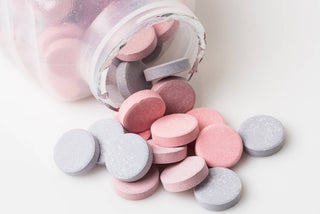One in ten Americans gets heartburn every day, and 44% have symptoms at least once a month. But even sufferers can be totally confused about what causes these symptoms and the best ways to manage them. Let’s get to the heart of the problem.
What Is Acid Reflux/GERD?
A lot of people think these terms are interchangeable, but acid reflux and gastroesophageal reflux disease (GERD), while closely related, are not the same.
Acid reflux, or gastroesophageal reflux, occurs when stomach acid flows backward into the esophagus. When it happens, you might taste regurgitated food or a sour liquid in the back of your throat, or experience heartburn (burning feeling in the chest).
GERD, on the other hand, is a more severe form of chronic reflux that can develop from acid reflux. It can occur multiple times per week and cause visible damage to your esophagus – much worse than what occasional acid reflux might cause. Symptoms can be similar but also may include nausea, coughing, sore throat, chest pain, difficulty swallowing, and even vomiting.
Causes of GERD
When the lower esophageal sphincter, the ring-like muscle around the bottom of your esophagus weakens or relaxes irregularly, stomach acid can backflow into the esophagus and cause GERD.
The acid can irritate and inflame the lining of the esophagus, and eventually, wear it away, leading to problems like bleeding, esophageal narrowing, or a precancerous condition known as Barrett’s esophagus.
Certain conditions can also increase your likelihood of developing GERD. They include:
- Being overweight
- Hiatal hernia
- Pregnancy
- Smoking
- Dry mouth
- Asthma
- Diabetes
- Delayed stomach emptying
- Connective tissue disorders, such as scleroderma
Medications to Treat GERD
There is a wide range of medications commonly used to treat acid reflux and GERD, but most fall into these three categories:
Antacids that neutralize stomach acid. Many of these are over-the-counter products, including Mylanta, Rolaids, and Tums. These antacids can abate symptoms quickly but do not treat esophageal inflammation or damage. And using them too frequently can result in unpleasant side effects like loose stools or constipation.
Acid-reducing medications. Also known as H-2-receptor blockers, these drugs block the release of stomach acid. They include cimetidine (Tagamet HB), famotidine (Pepcid AC), nizatidine (Axid AR), or ranitidine (Zantac). These medications take longer to work than antacids, but they relieve symptoms longer and may decrease stomach acid production for up to 12 hours. Stronger prescription-only versions are also available.
Acid-blocking medications. These drugs, known as proton pump inhibitors (PPIs), block acid production better than H-2-receptor blockers and allow time for esophageal damage to heal. Over-the-counter medications include lansoprazole (Prevacid 24 HR) and omeprazole (Prilosec OTC), and prescription-strength formulas include stronger versions of the former plus esomeprazole (Nexium), pantoprazole (Protonix), rabeprazole (Aciphex), and dexlansoprazole (Dexilant).
Problems With GERD Medications
While GERD medications can help reduce symptoms for many, new research finds that they may have unwanted and sometimes unsafe side effects.
Stomach acid does contribute to painful symptoms, but we need it to stay healthy. Stomach acid helps us properly digest food, activates digestive enzymes in the small intestine and keeps bacterial overgrowth in check, and helps with absorption of nutrients like calcium, magnesium, and B12.
Block the acid, and you can interrupt these functions and develop vitamin and mineral deficiencies, anemia, fatigue, depression, as well as conditions like osteoporosis and irritable bowel syndrome.
Other research speculates that GERD medications can contribute to changes in the gastrointestinal tract’s microbiome, leading to dangerous overgrowth of bacteria such as C. difficile, campylobacter, salmonella, shigella, or E. coli, which can turn into serious infections.
What Doctors Won’t Tell You About Acid Reflux Drugs
7 Ways To Manage GERD Without Drugs
Long-term treatment of acid reflux and GERD means more than just popping a pill to stop the symptoms. Speak with your doctor about what else you can do for relief, because there are more controllable factors than you might think. Once you take control, you can take heart that heartburn doesn’t have to rule your life!

